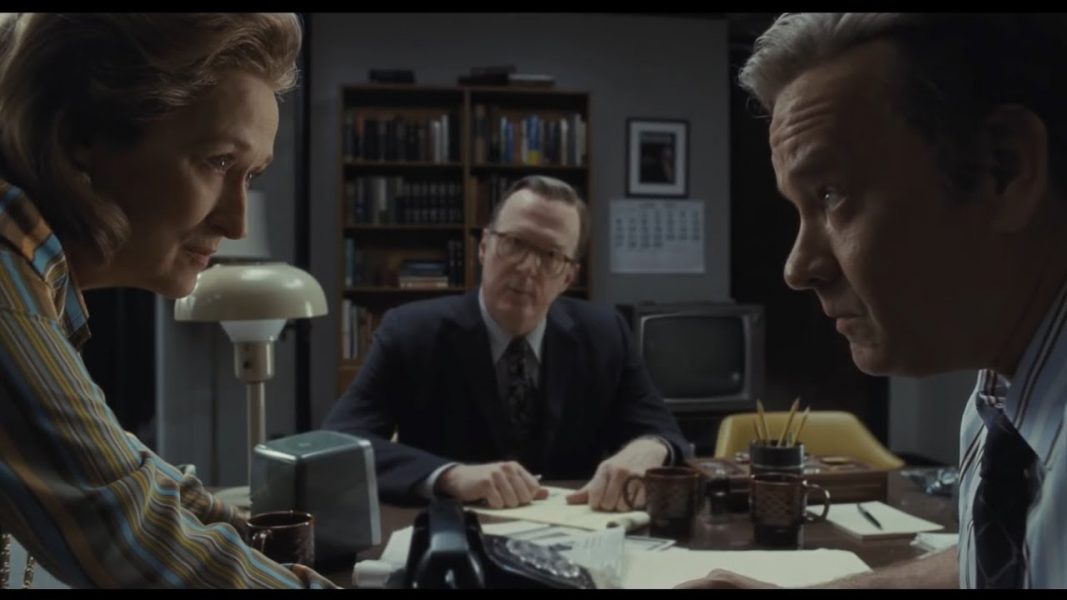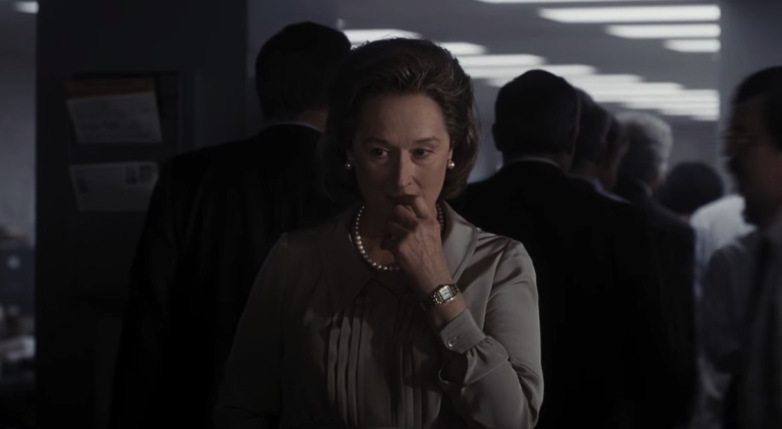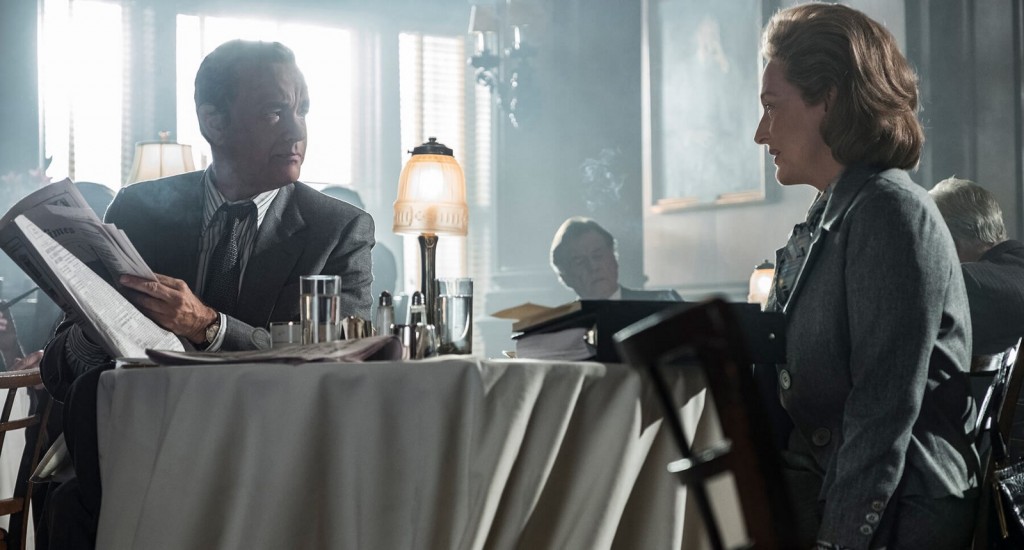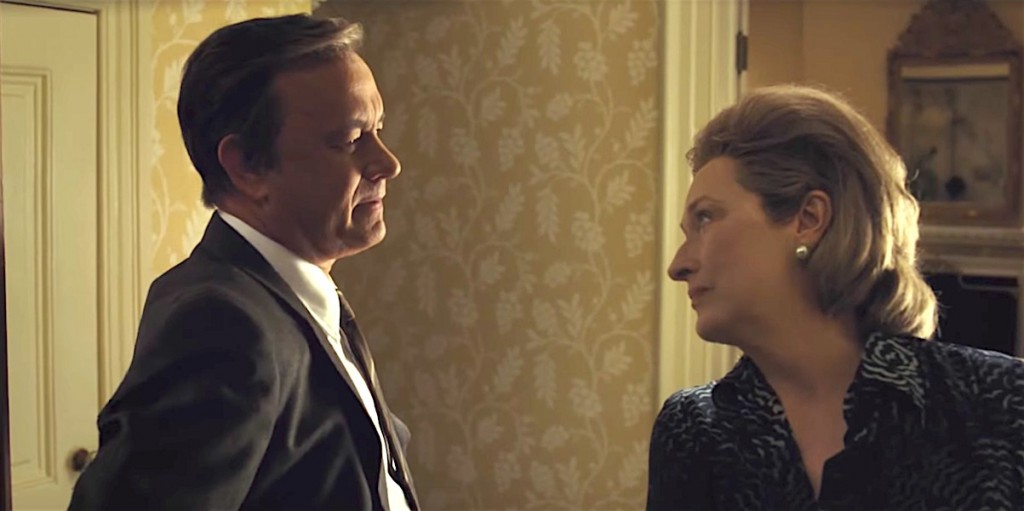Steven Spielberg’s The Post is the film America and the world need right now; an intelligent yet understated primal scream for the truth, for the importance of the truth in the news, for the news medias duty and responsibility to report the truth, no matter how difficult it might be. Not since All the President’s Men (1976) has a film about journalism been so vital, so necessary, and so utterly brilliant.
It is one of those films that seems to speak to us all, right now, about what is happening in the world, the directing and writing possessed of an urgency that demands we listen. The Post is electrifying, intelligent, thrilling, unsettling, superbly acted, directed, written and created, and altogether remarkable.
Since ascending to the office of President, Donald Trump has managed to make a mockery of the office and frankly himself around the globe. Knowing the media neither liked him or trusted him, he first attacked them, claiming they reported fake news. This is of course absurd, as the news we hear is researched, confirmed, then researched again before it goes on the air or to print. What Trump worries about of course is that the deeper they dig, the more they could get on him, and I suspect that is a very deep well. We know he lies, we know he makes things up and declares them to be the truth, just because he says so. Should a man like that, a maniacal, power hungry narcissistic buffoon, be President? In the days since he took office the news network CNN has become Trump TV, each day filled with “what did he do now”? The press should follow Trump, ignore the bans he places and continue digging; he must be exposed, he must be monitored, whatever secrets he holds close must be known because he is a danger to us all. His blatant abuse of power is shocking, that he continues to get away with everything he does and says, obscene.

Spielberg’s film does not deal with Trump directly, but the issues within the film, set in the seventies are as timely, as urgent as ever, ringing of a truth we need in the press. The gifted director has created an allegory for the ages, one that he felt was necessary to make “right now” and he was as right as he has ever been.
In the seventies, the Pentagon Papers fell into the hands of both the New York Times and the Washington Post. Faced with the difficult decision of publishing what amounted to national security, the Times lost their battle in court, President Nixon flexing his muscles and power. The infamous Pentagon Papers detailed how Presidents Truman, Eisenhower, Kennedy, and Johnson, especially Johnson lied to the American public about the war in Viet Nam, and the subsequent escalation of that conflict. Clearly the Nixon White House did not want those facts published, fearing repercussions with an election year looming.
The Post had come under new ownership, Katherine Graham (Meryl Streep) taking command after the death of her husband. Fiercely interested in making the paper the best it can be , she entrusts it and editorial decisions to Ben Bradley (Tom Hanks). Graham is faced with the decision of challenging the White House and printing the papers which explore the escalation of the war in Viet Nam despite the government knowing the war was futile and lost.

Plunging us back into the Seventies, when copy was written on typewriters, when the newsroom bustled with activity and noise, we watch fascinated as writers create without the internet, making phone calls, digging into a story to finds its truth. Here Mrs. Graham has a vital decision to make. Should the American people who would re-elect Nixon in a stunning landslide, know about his decisions regarding the most unpopular in the history of the United States? The answer is of course, but with power of the White House breathing down their necks, threatening ruin, what do you do? History shows that she made the right decision, and a year later two reporters began digging into a burglary at the Watergate Hotel that would reach into the Oval Office and bring down Nixon. Without the courage to publish the Pentagon Papers, would The Post have had the greater courage to pursue the Watergate story into the White House? Into the Oval Office?
I think young women need to know the impact in recent American history of women, of their courage, their intellect, their vision, their unspoken war in proving themselves in a man’s world. There is no question men need to be reminded as well.
What is there left to say about Meryl Streep? With twenty Academy Award nominations, she is the most lauded actress in modern cinema. As Katherine Graham she is of course astonishing, coming into a man’s world late in life but making no bones about the fact she was to be dealt with seriously. Initially she is openly mocked by the men who work for her and her own Board of Directors, their thinking how could a woman do a man’s job? Digging in, her intellect spinning, she demonstrated exactly how formidable she truly was. Refusing to back away from the White House, she uses the constitution for her right to publish those papers, and she is right in doing so. A nomination for Best Actress is assured, and if the film catches fire, as I suspect it will, she might just win. I imagine, as being anti-Trump, she loved making this film, knowing what the film was saying has great resonance.
As Ben Bradlee, Tom Hanks has a distinct disadvantage in that Jason Robards played the part in All the Presidents Men (1976) and won an Oscar, along with every other critics award for his powerful performance. It is almost a reminder of what a great Hanks is that he makes the part his own and is equally superb. Knowing the story they are sitting could alter the history of the country, but aware of the governments ferocious protests, he must walk a careful line, he must be sure and present it to Graham cautiously, truthfully. Cautious but smelling a huge story his newsman sense wants to see it a go, but his respect for Graham is front and centre, he does not want her bullied or humiliated. Hanks has the courage to portray Bradlee with a mean streak, something he was known to have, and bring into play when necessary. He proved to be ruthless a year later when the Watergate story broke, which of course led to the resignation of President Richard Nixon.
And that is precisely what Trump fears, that the reporting of the truths, the truths of his inner corruption, his inner circles corruption and misdeed will bring him down as it did Nixon. The difference is, Nixon was truly a great President undone by his own insecurity and ego, Trump is nothing of the kind and will be brought down by his massive ego and blinding arrogance.

There are marvellous supporting performances from the great Sarah Paulson and Bob Odenkirk, both who could leap into the Oscar race, Paulson in particular, continuing to evolves into the greatest character actress of her generation.
Spielberg continues to amaze with his sublime artistry, evolving it seems with each new picture. I was not sure he would ever make a more political film than his superb Lincoln (2012) yet he achieves that with this superb work. He had long wanted to work with Streep, beyond the voice work she did in A. I. : Artificial Intelligence (2001), and Hanks too had waited for a chance, thinking time had passed him by. The three of them create movie magic here, a fiercely, intelligent film that explores a pivotal moment in American history yet reaches forward to the present to explore the dangers of banning the press or having anything short of a free press. It is without question the single most important film made this year, and along with Schindler’s List (1993) the most important of Spielberg’s career. Like Munich (2005) and the sublime Lincoln (2012) the film was made with great care and intelligence, yet has its sights firmly on target.
The Cinematography of Janus Kaminski is crisp and clean, documentary like but manages to give the feel of seventies cinema.
The film was shot through the summer, edited in the fall and in an incredible turnaround is in theatres a less than a year after it was cast.
It is easily one the very best film of the year.
Rating: 4.5/5


You must be logged in to post a comment.